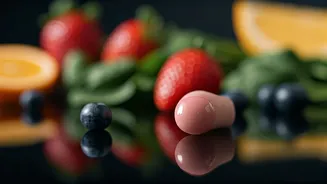Nail Health Fundamentals
Nail health is a reflection of overall well-being. Proper care involves more than just manicures; it starts from within. The composition of nails is primarily
keratin, a protein also found in hair and skin. A healthy diet rich in essential nutrients is vital for strong nails. Hydration plays a key role too, as it keeps nails moisturized and prevents dryness, which can lead to brittleness and breakage. Furthermore, avoiding harsh chemicals, protecting nails during activities, and gentle filing can also play a major role in keeping your nails healthy. Recognizing the signs of unhealthy nails—such as splitting, ridges, or discoloration—can guide you to make the required adjustments in your lifestyle to improve nail strength and appearance.
Foods for Strong Nails
Specific foods are packed with nutrients vital for nail health. Biotin, a B-vitamin, is a well-known supporter of nail strength; it helps reduce brittleness. Foods like eggs, sweet potatoes, and avocados are good sources of biotin. Protein is essential, as nails are made of keratin. Lean meats, fish, and legumes provide the protein needed. Iron deficiency can cause brittle nails. Incorporating iron-rich foods, such as spinach, lentils, and fortified cereals, can help. Omega-3 fatty acids, found in flaxseeds, chia seeds, and fatty fish like salmon, provide moisture and promote nail flexibility. Vitamin C assists with collagen production, which strengthens nails; citrus fruits, bell peppers, and strawberries are good sources. Zinc is another mineral crucial for nail growth and health, and can be obtained through consumption of nuts, seeds, and whole grains. Include these foods in your regular diet to see improvements in the condition of your nails.
Hydration's Vital Role
Adequate hydration is a cornerstone of healthy nails. Dehydration can lead to dry, brittle nails that are prone to splitting and breaking. Aim to drink an adequate amount of water throughout the day, and the exact quantity may vary based on individual needs and activity levels. If you are active or live in a warm environment, you may need more. In addition to drinking water, consider incorporating hydrating foods into your diet. Fruits and vegetables with high water content, such as cucumbers, watermelons, and spinach, can boost your hydration levels. Using a moisturizing hand cream can also help keep your nails and the surrounding skin hydrated, particularly after washing your hands or using hand sanitizers. This helps to prevent dryness. A balanced diet and sufficient hydration work together to foster healthy, resilient nails.
Nail Care Practices
Practicing good nail care is an essential part of maintaining nail health. Start by keeping your nails clean and dry to prevent infections. Trim nails regularly, using sharp nail clippers or scissors to avoid jagged edges that can lead to breakage. When filing, always move in one direction to avoid weakening the nails. Use a base coat before applying nail polish to protect your nails from staining. Choose nail polish removers that are acetone-free or contain low levels of acetone, as acetone can be very drying. Minimize exposure to harsh chemicals, wearing gloves when cleaning or doing dishes. If you work with your hands a lot, wear gloves to shield your nails from any damage. Take breaks from nail polish to let your nails 'breathe'. By integrating these practices into your routine, you can promote stronger, healthier, and more beautiful nails.
Addressing Deficiencies
Nutrient deficiencies can significantly affect nail health, revealing underlying imbalances within the body. If you notice persistent nail problems like brittleness, splitting, or ridges, it may indicate a deficiency of essential nutrients. For example, brittle nails may be caused by a lack of biotin, iron, or zinc. Ridges can also indicate a potential iron deficiency. In such cases, consulting a doctor or a registered dietitian is important to determine the exact nature of the deficiency through a blood test. Once identified, the issue can be addressed through dietary adjustments or supplementation. However, it's always best to consult a healthcare professional before taking supplements. Correcting deficiencies not only improves nail health but also supports overall well-being. Focusing on a well-balanced diet and the potential use of supplements can contribute towards healthier nails.















